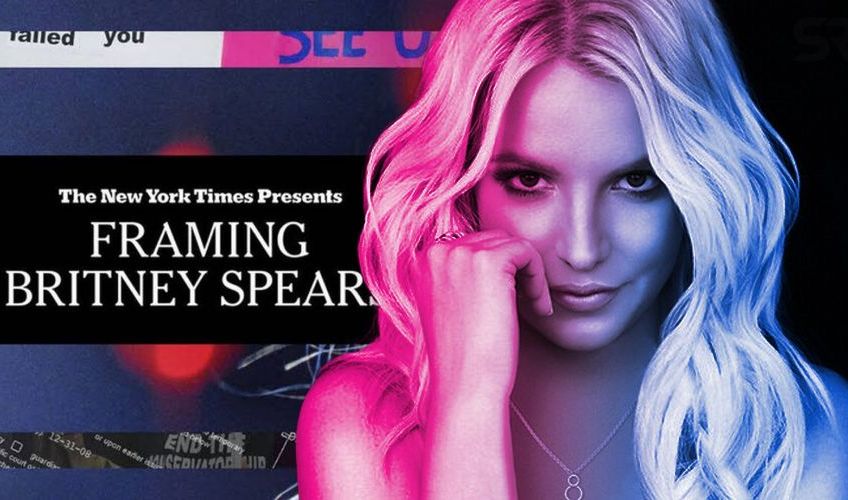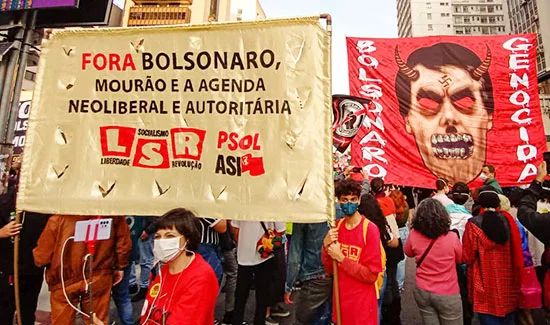Aislinn O’Keeffe is a member of the Socialist Party (ISA in Ireland).
In 1992, a ten-year-old Britney Spears performed a powerful version of The Judds ‘Love Can Build a Bridge’. The host, Ed McMahon, interviewing her afterwards remarks on her ‘pretty eyes’ and asks her whether or not she has a boyfriend. A clearly uncomfortable Britney continues to smile and be polite, choosing her words carefully as she attempts to navigate a response in front of a large audience. It is a situation that most women and girls will be familiar with — forced into the position of managing an adult man’s emotions in the face of inappropriate comments — and an encounter that would come to characterise Spears’ career. Incidentally, her 12-year-old male opponent, on the other hand, was asked what it was like to grow up on a farm.
The documentary “Framing Britney Spears” documents the #FreeBritney movement and tracks Spears’ career, and the events that led up to the conservatorship that the 39-year-old performer and artist is currently subject to. It tracks the trajectory of the superstar, from down-to-earth, vivacious teenager to a young woman harassed and hounded by the capitalist media and pushed to the point of a mental breakdown.
Corporate sexism
One of the glaring features of the footage documenting Spears’ rise to fame is the blatant sexualisation and objectification of the young star from the age of just 16 years old. From the sexualised school girl outfit of ‘Hit Me Baby One More Time’ to interviews and press conferences where presenters, often men more than twice her age, question the teenager about her breasts, kissing boys, her outfits and her virginity. Britney is hyper-sexualised by her record company and the capitalist media, which is contradicted by a media obsession with her virginity. This illustrates the trap that all women and girls are forced into — be sexy but not sexual — representing an impossibly precarious tightrope that women must walk where the acceptable balance is perpetually out of reach.
The sexualisation and objectification of Britney Spears however is not an anomaly or a once-off occurrence experienced by just one individual. Rather, the experience of Spears is an illustration of the wider societal problem of the objectification of all women and girls in capitalist society. Objectification is the process of reducing human beings to the status of mere objects, it is a process of dehumanisation. In capitalist society today, the process of the objectification of women is carried out through a preoccupation with women’s appearance above all other considerations and its harmful ideology is disseminated through advertising, TV, magazines, music, movies etc. which all play a role in normalising the phenomenon which is adopted and replicated widely.
Objectification for profit
But what benefit does the objectification of women have for capitalists? Whole industries have grown from the exploitation of women through objectification. The global beauty industry is projected to be worth $438.38 billion dollars by 2026, while the global porn industry, which peddles limited beauty ideals, is worth $97 billion dollars annually. A wealth of other industries profit from this objectification: including fashion, TV, movie, retail, mass media, and social media industries.
If objectification devalues women as humans, it also devalues the activities that they engage in. This is especially true if those activities are specifically associated with women, for example domestic and care work, which women overwhelmingly perform for free saving the global economy $10 trillion annually according to a 2018 Oxfam report. In the workplace, this translates as lower pay for women which marks a clear benefit for employers.
Dehumanisation leads to violence
What other prices do women and girls pay for this objectification? Objects are not human; they are items to be used and discarded at will. When women and girls are routinely objectified in society this affects the way in which they are viewed and ultimately how they are treated. This process is evident in the treatment of Spears in the media — for example, publications and presenters focused on her appearance and perceived sexuality to the detriment of her immense talent, and her personhood and humanity. Again, this is replicated across society with working class women, LGBTQ+, migrant women, women of colour, Traveller women, and women with disabilities suffering most harshly as a result.
Objectification and its dehumanising effects pave the way for violence. In 2019, Women’s Aid reported that since 1996, 230 women have died violently in Ireland — 87% killed by a man known to them. A whopping one in three women globally has experienced physical or sexual violence in their lifetime. 60% of women are likely to experience harassment in the workplace and 71% have experienced unwanted touching or groping in public. On top of this, women routinely experience unwanted attention, inappropriate remarks and other ‘lesser’ forms of sexism, often on a daily basis.
The toll on women and girls of a lifetime of such experiences is gargantuan. The impact of unrealistic beauty standards, violence, harassment, and the societal gaslighting of girls and women in the face of their experiences have a devastating impact on mental health. While men are more likely to die by suicide, a higher proportion of women and girls who attempt suicide. In 2016, women and girls were 24% more likely to self-harm, also suffering low self-esteem, depression, anxiety, eating disorders, and trauma related mental health issues. All of these factors curtail women’s ability to move freely in the world and negatively impact their quality of life.
We won’t take it anymore
However, there are positive indications arising from the current discussion around the treatment of Britney Spears. Namely, that there has been a massive shift in attitudes since the late 1990’s and 2000’s. Many young people, along with those who came of age with Spears, look back in horror at the hyper-sexualisation of the star and her treatment by the media. Attitudes that were completely normalised at the time, are completely rejected by a large swathe of young people who are now supporting the #FreeBritney movement. New generations are getting active and organising against sexist conventions and oppression which can also be seen in the rise of the #MeToo movement.
The fact that attitudes have transformed over such a short period of time is testament to the power of mass organisation and shows the potential for future struggles against the current organising of society around profit, to the detriment of humanity. As socialists, we understand that patriarchal structures and ideals are tools utilised by capitalism to maintain and justify inequality. Therefore, the struggle against this oppressive system necessitates a thorough understanding of, and fight back against, the oppression of women and all minorities as a central feature of organising ourselves with the rest of the working class.


